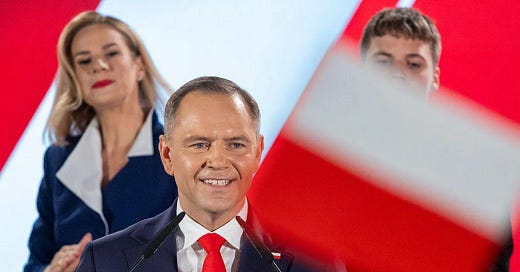Nawrocki Wins Polish Presidential Election
Trump-Aligned Candidate Karol Nawrocki Defeats Centrist Rafał Trzaskowski
Karol Nawrocki, a right-wing presidential candidate, has narrowly defeated centrist opponent Rafał Trzaskowski in the second round of Poland’s presidential election, winning by a margin of less than 2%. The result signals some continuity for the Law and Justice (PiS) party, whose incumbent president, Andrzej Duda, is completing his final term, while posing challenges for the EU-aligned government led by Prime Minister Donald Tusk.
Poland’s president holds power to veto legislation, meaning Nawrocki’s win could hinder reforms—and budgets—proposed by Tusk’s cabinet.
Trzaskowski, the current mayor of Warsaw, campaigned on a platform more open to securing access to abortion and strengthening basic LGBTQ rights. Nawrocki, on the other hand, announced he would prioritize the needs of Polish citizens over a large migrant population from Ukraine and used a more critical discourse toward Ukrainian President Volodymyr Zelenskyy. His Eurosceptic rhetoric also suggested future tensions between Poland and the European Union.
While critical of the EU, Nawrocki has emphasized a close alignment with the United States. During the election race, Nawrocki benefited from strong backing by the PiS party and expressions of support from figures aligned with the US presidency.
Among those endorsing Nawrocki was Kristi Noem, Homeland Security Secretary under Donald Trump, who publicly encouraged Poles to vote for him. She suggested that Nawrocki’s election would bring the country regional admiration and international advantages. “If you elect a leader who will work with President Trump, the Polish people will have a strong ally,” Noem stated. “You will continue to have a US presence here, a military presence. And you will have equipment that is American-made, that is high quality.”
In the final weeks of the campaign, the Conservative Political Action Conference (CPAC) organized a meeting in Rzeszów, southeastern Poland, boosting Nawrocki’s bid. Speakers including Matt Schlapp voiced alarm over a potential Trzaskowski victory, warning that Poland would fall prey to “the woke Left” and “Marxist elites.”
Nawrocki himself addressed the meeting, calling for Europe to opt for “a strong, conservative voice” to make up for its past mistakes. “Europe should not be dormant. Europe should not be pushed to the margins of geopolitical changes. Europe should preserve its identity,” he stated, echoing the rhetoric of European far-right alliances like the Patriots for Europe and figures like Hungarian Prime Minister Viktor Orbán.
Nawrocki’s victory is undoubtedly a setback for advocates of reproductive and LGBTQ rights, given the president’s veto power and alignment with PiS, which has upheld one of Europe’s most dreadful abortion regimes. However, it’s worth noting that even under Tusk’s nominally centrist government, Poland has remained one of the EU’s most aggressive proponents of rearmament. So-called defense spending is approaching 5% of GDP—and this trend is unlikely to change with Nawrocki.





